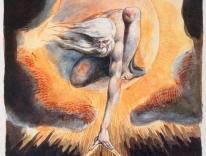The title of Psalm 83/84 has the word gittith, which today is often left untranslated and is taken to refer to some kind of musical instrument. The Septuagint and early Latin versions of the Psaltery appealed to one possible etymology and translated the word as "wine-presses" (torcular in Latin). This explains Augustine's initial comment below where he refers to the pressing out of wine or of oil. Elsewhere he expands considerably on how the image of a wine- or oil-press applies to the life of the Church on earth. Here he focuses on what may flow from experiences of pressure and trial:
They are poor who are without any worldly wealth, and, even if it were to abound, they know how uncertain it is. Sighing for God, having nothing to delight them in this world, nothing to possess them, placed in the press by the pressures and temptations they experience, they flow with wine, they flow with oil. And what are these? Their good desires. Already they do not love the earth, and God remains as the object of their desire. They love the one who made heaven and earth, but they are not with him. Their desire is deferred so that it may grow; it grows so that one day it may attain.No small thing will God give to those who desire him, and no slight effort is required in order to become capable of so great a good. God is not going to give something he has made; he is going to give himself, the one who made all things. Make the effort to attain God. Continue to desire what you will possess forever. (Augustine, En in Ps 83/84, 3; PL 37, 1057)


